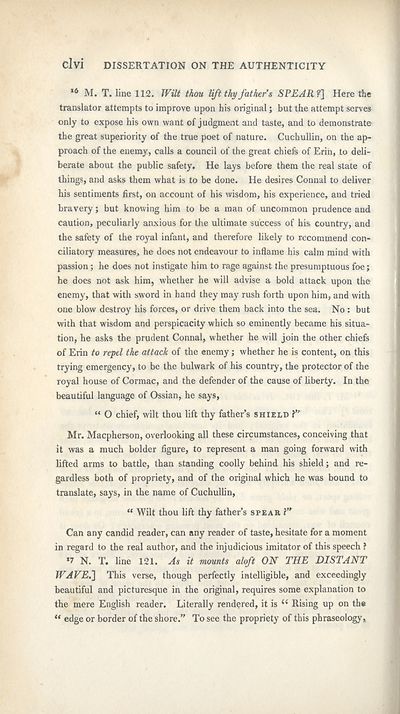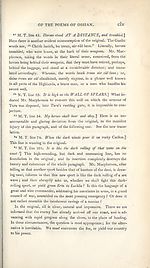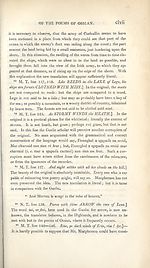Books and other items printed in Gaelic from 1801 to 1840 > Poems of Ossian in the original Gaelic > Volume 1
(172) Page clvi
Download files
Complete book:
Individual page:
Thumbnail gallery: Grid view | List view

Civi DISSERTATION ON THE AUTHENTICITY
»* M. T. line 112, JVili thou lift thy father's SPEAR?} Here the
translator attempts to improve upon his original; but the attempt serves
only to expose his own want of judgment and taste, and to demonstrate
the great superiority of the true poet of nature. Cuchullin, on the ap¬
proach of the enemy, calls a council of the great chiefs of Erin, to deli¬
berate about the public safety. He lays before them the real state of
things, and asks them what is to be done. He desires Connal to deliver
his sentiments first, on account of his wisdom, his experience, and tried
bravery; but knowing him to be a man of uncommon prudence and
caution, peculiarly anxious for the ultimate success of his country, and
the safety of the royal infant, and therefore likely to recommend con¬
ciliatory measures, he does not endeavour to inflame his calm mind with
passion; he does not instigate him to rage against the presumptuous foe;
he does not ask him, whether he will advise a bold attack upon the
enemy, that with sword in hand they may rush forth upon him, and with
one blow destroy his forces, or drive them back into the sea. No : but
with that wisdom and perspicacity which so eminently became his situa¬
tion, he asks the prudent Connal, whether he will join the other chiefs
of Erin to repel the attack of the enemy; whether he is content, on this
trying emergency, to be the bulwark of his country, the protector of the
royal house of Cormac, and the defender of the cause of Uberty. In the
beautiful language of Ossian, he says,
" O chief, wilt thou lift thy father's shield ?"
Mr. Macpherson, overlooking all these circumstances, conceiving that
it was a much bolder figure, to represent a man going forward with
lifted arms to battle, than standing coolly behind his shield; and re¬
gardless both of propriety, and of the original which he was bound to
translate, says, in the name of Cuchullin,
" Wilt thou lift thy father's spear i"
Can any candid reader, can any reader of taste, hesitate for a moment
in regard to the real author, and the injudicious imitator of this speech ?
'7 N. T. line 121. As it mounts aloft ON THE DISTANT
WAVE.} This verse, though perfectly intelligible, and exceedingly
beautiful and picturesque in the original, requires some explanation to
the mere English reader. Literally rendered, it is " Rising up on th*
" edge or border of the shore." To see the propriety of this phraseology^
»* M. T. line 112, JVili thou lift thy father's SPEAR?} Here the
translator attempts to improve upon his original; but the attempt serves
only to expose his own want of judgment and taste, and to demonstrate
the great superiority of the true poet of nature. Cuchullin, on the ap¬
proach of the enemy, calls a council of the great chiefs of Erin, to deli¬
berate about the public safety. He lays before them the real state of
things, and asks them what is to be done. He desires Connal to deliver
his sentiments first, on account of his wisdom, his experience, and tried
bravery; but knowing him to be a man of uncommon prudence and
caution, peculiarly anxious for the ultimate success of his country, and
the safety of the royal infant, and therefore likely to recommend con¬
ciliatory measures, he does not endeavour to inflame his calm mind with
passion; he does not instigate him to rage against the presumptuous foe;
he does not ask him, whether he will advise a bold attack upon the
enemy, that with sword in hand they may rush forth upon him, and with
one blow destroy his forces, or drive them back into the sea. No : but
with that wisdom and perspicacity which so eminently became his situa¬
tion, he asks the prudent Connal, whether he will join the other chiefs
of Erin to repel the attack of the enemy; whether he is content, on this
trying emergency, to be the bulwark of his country, the protector of the
royal house of Cormac, and the defender of the cause of Uberty. In the
beautiful language of Ossian, he says,
" O chief, wilt thou lift thy father's shield ?"
Mr. Macpherson, overlooking all these circumstances, conceiving that
it was a much bolder figure, to represent a man going forward with
lifted arms to battle, than standing coolly behind his shield; and re¬
gardless both of propriety, and of the original which he was bound to
translate, says, in the name of Cuchullin,
" Wilt thou lift thy father's spear i"
Can any candid reader, can any reader of taste, hesitate for a moment
in regard to the real author, and the injudicious imitator of this speech ?
'7 N. T. line 121. As it mounts aloft ON THE DISTANT
WAVE.} This verse, though perfectly intelligible, and exceedingly
beautiful and picturesque in the original, requires some explanation to
the mere English reader. Literally rendered, it is " Rising up on th*
" edge or border of the shore." To see the propriety of this phraseology^
Set display mode to:
![]() Universal Viewer |
Universal Viewer | ![]() Mirador |
Large image | Transcription
Mirador |
Large image | Transcription
Images and transcriptions on this page, including medium image downloads, may be used under the Creative Commons Attribution 4.0 International Licence unless otherwise stated. ![]()
| Rare items in Gaelic > Books and other items printed in Gaelic from 1801 to 1840 > Poems of Ossian in the original Gaelic > Volume 1 > (172) Page clvi |
|---|
| Permanent URL | https://digital.nls.uk/105401915 |
|---|
| Attribution and copyright: |
|
|---|---|
| Description | Out-of-copyright books printed in Gaelic between 1631 and 1900. Also some pamphlets and chapbooks. Includes poetry and songs, religious books such as catechisms and hymns, and different editions of the Bible and the Psalms. Also includes the second book ever published in Gaelic in 1631. |
|---|

